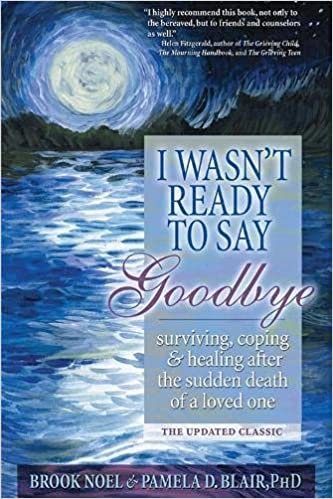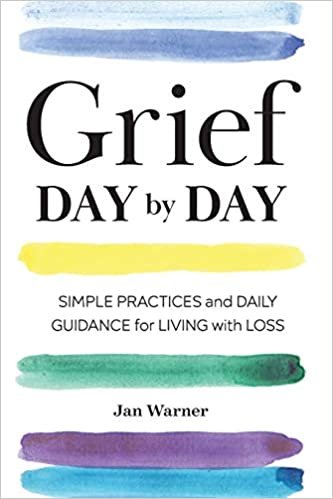Grief & Loss Books
To be redirected to an Amazon.ca page to purchase a copy of the book, simply click on the book image.
-
This book provides a path to rethink our relationship with grief. It encourages readers to see their grief as a natural response to death and loss, rather than an aberrant condition needing transformation. By shifting the focus from grief as a problem to be solved to an experience to be tended, we give the reader what we most want for ourselves: understanding, compassion, validation, and a way through the pain.
It’s OK That You’re Not OK shows readers how to live with skill and compassion during their grief, but it isn’t just a book for people in pain: this book is about making things better for everyone. All of us are going to experience deep grief or loss at some point in our lives. All of us are going to know someone living great loss. Loss is a universal experience.
-
Organized into fifty-two short chapters, Bearing the Unbearable is a companion for life’s most difficult times, revealing how grief can open our hearts to connection, compassion, and the very essence of our shared humanity. Dr. Joanne Cacciatore—bereavement educator, researcher, Zen priest, and leading counselor in the field—accompanies us along the heartbreaking path of love, loss, and grief. Through moving stories of her encounters with grief over decades of supporting individuals, families, and communities—as well as her own experience with loss—Cacciatore opens a space to process, integrate, and deeply honor our grief.
-
Mourning the death of a loved one is a process all of us will go through at one time or another. But wherever the death is sudden or anticipated, few of us are prepared for it or for the grief it brings. There is no right or wrong way to grieve; each person's response to loss will be different. Now, in this compassionate, comprehensive guide, Therese A. Rando, Ph.D., bereavement specialist and author of Loss And Anticipatory Grief, leads you gently through the painful but necessary process of grieving and helps you find the best way for yourself.
-
In this title, a leading expert in the field of emotions research challenges the conventional model of the 'Five Stages of Grief' offering fascinating new insights on the bereavement process and the ways in which we find positive meaning in loss.
In "The Other Side of Sadness", psychologist and emotions expert George Bonanno highlights a complete rejection of the widely-accepted theory of grief model established by Elisabeth Kubler-Ross, which notes five distinct stages we go through during loss and bereavement. Until now, we have come to understand grief as a predictable and straightforward process of: denial; anger; bargaining; depression; and, acceptance. But in this paradigm-shifting new look at loss and life, George Bonanno proves otherwise: he argues that this process discounts our universal ability to be resilient, and does not allow for exceptions, which ultimately does a disservice to those in need. Weaving in fascinating explorations of Chinese mourning rituals, case studies from families who lost a loved one during 9/11, and more, Bonanno offers a refreshing new discussion of cultural differences surrounding loss and healing-something most books about grief gloss over - and argues that we are much more capable than we know.
-
The grief book that just "gets it." Whether you're grieving the sudden loss of a loved one or helping someone else through their grief, I Wasn't Ready to Say Goodbye offers a comforting hand to help guide you through the grieving process, from the first few weeks to the longer-term emotional and physical effects. It then reveals some of the myths of the grieving process and what really happens as you navigate through the pain.
-
After a loved one dies, each day can be a struggle. But each day, you can also find comfort and understanding in this daily companion. With one brief entry for every day of the calendar year, this little book by beloved grief counselor Dr. Alan Wolfelt offers small, one-day-at-a-time doses of guidance and healing. Each entry includes an inspiring or soothing quote followed by a short discussion of the day’s theme. This compassionate gem of a book will accompany you.
-
Grief is complex; it may present itself differently on any given day. This grief recovery handbook offers daily reflections and practices that address the day-to-day emotions and experiences that accompany the grieving process so you can create a life in which peace―and even gratitude―can coexist with your grief.
Explore the stages of grief with a collection of quotes, musings, meditations, and more that are tied together by a weekly theme, allowing you to reflect on each concept in depth. Work through topics like loneliness, grief attacks, exhaustion, hope, love, and creating meaning. You’ll find opportunities to write, draw, meditate, do breathing exercises, and more as you learn to live fully with your grief.
-
Incomplete recovery from grief can have a lifelong negative effect on the capacity for happiness. Drawing from their own histories as well as from others', the authors illustrate how it is possible to recover from grief and regain energy and spontaneity. Based on a proven program, The Grief Recovery Handbook offers grievers the specific actions needed to move beyond loss.
-
The classic guide for dealing with grief and loss
For those who have suffered the loss of a loved one, here are thoughtful words to strengthen, inspire and comfort.
-
In 1969, Elisabeth Kübler-Ross first identified the stages of dying in her transformative book On Death and Dying. Decades later, she and David Kessler wrote the classic On Grief and Grieving, introducing the stages of grief with the same transformative pragmatism and compassion. Now, based on hard-earned personal experiences, as well as knowledge and wisdom gained through decades of work with the grieving, Kessler introduces a critical sixth stage: meaning.
Kessler’s insight is both professional and intensely personal. His journey with grief began when, as a child, he witnessed a mass shooting at the same time his mother was dying. For most of his life, Kessler taught physicians, nurses, counselors, police, and first responders about end of life, trauma, and grief, as well as leading talks and retreats for those experiencing grief. Despite his knowledge, his life was upended by the sudden death of his twenty-one-year-old son. How does the grief expert handle such a tragic loss? He knew he had to find a way through this unexpected, devastating loss, a way that would honor his son. That, ultimately, was the sixth stage of grief—meaning. In Finding Meaning, Kessler shares the insights, collective wisdom, and powerful tools that will help those experiencing loss.
-
On Grief and Grieving applies the five stages of death—denial, anger, bargaining, depression, and acceptance— to the grieving process and weaves together theory, inspiration, and practical advice, including sections on sadness, hauntings, dreams, isolation, and healing. This is “a fitting finale and tribute to the acknowledged expert on end-of-life matters.”
-
In You Can Heal Your Heart, self-empowerment luminary Louise Hay and renowned grief and loss expert David Kessler have come together to start a conversation on healing after loss. Louise and David discuss the emotions and thoughts that occur when a relationship leaves you brokenhearted, a marriage ends in divorce, or a loved one dies. They will also help you develop greater self-awareness and compassion, providing you with the courage and tools to face many other types of losses and challenges, such as saying good-bye to a beloved pet, losing your job, coming to terms with a life-threatening illness or disease, and much more.
With a perfect blend of Louise’s affirmations and teachings on the power of your thoughts and David’s many years of working with those in grief, this remarkable book will inspire an extraordinary new way of thinking, bringing profound love and joy into your life. You will not only learn how to harness the power of your grief to help you grow and find peace, but you will also discover that, yes, you can heal your heart
Disclaimer: CCIPH may earn a small commission from Amazon.ca’s Affiliate Program for recommendations or links to any products or services from this website. There is never any additional cost to you when you purchase through use of these links. Recommendations are not biased or influenced by Amazon.ca in any way.












